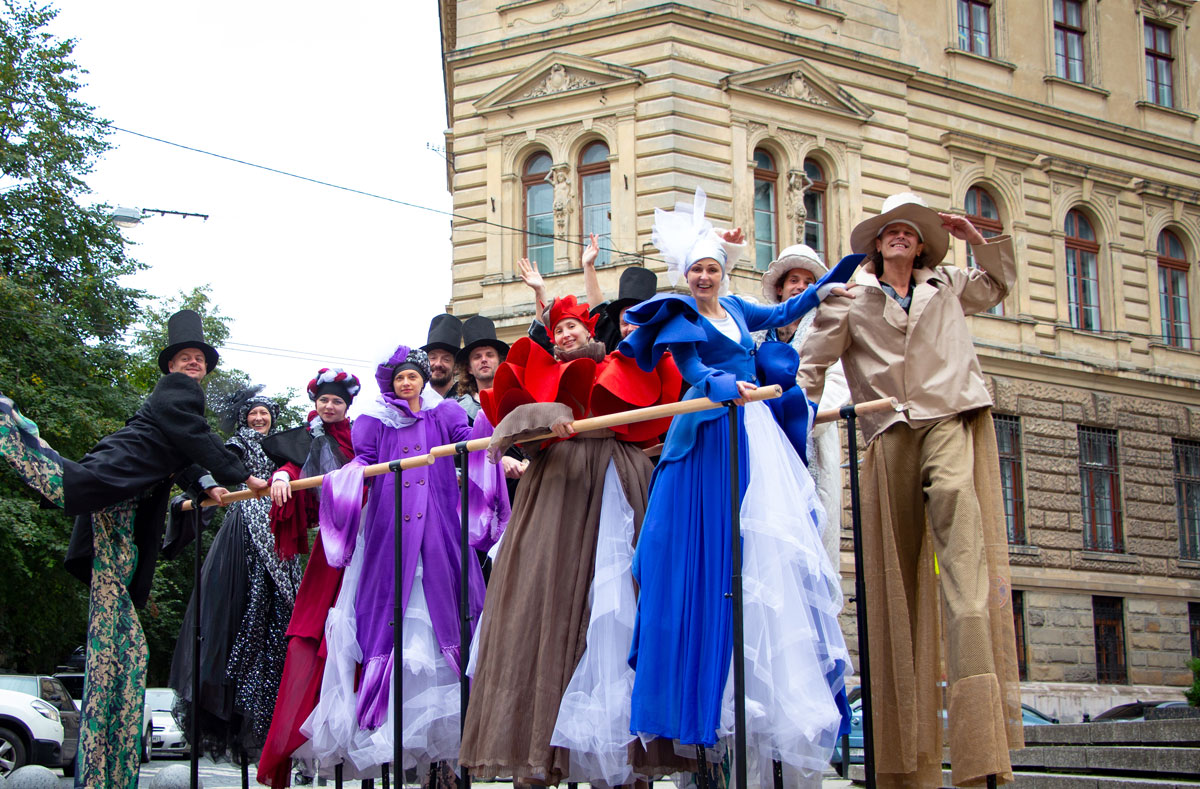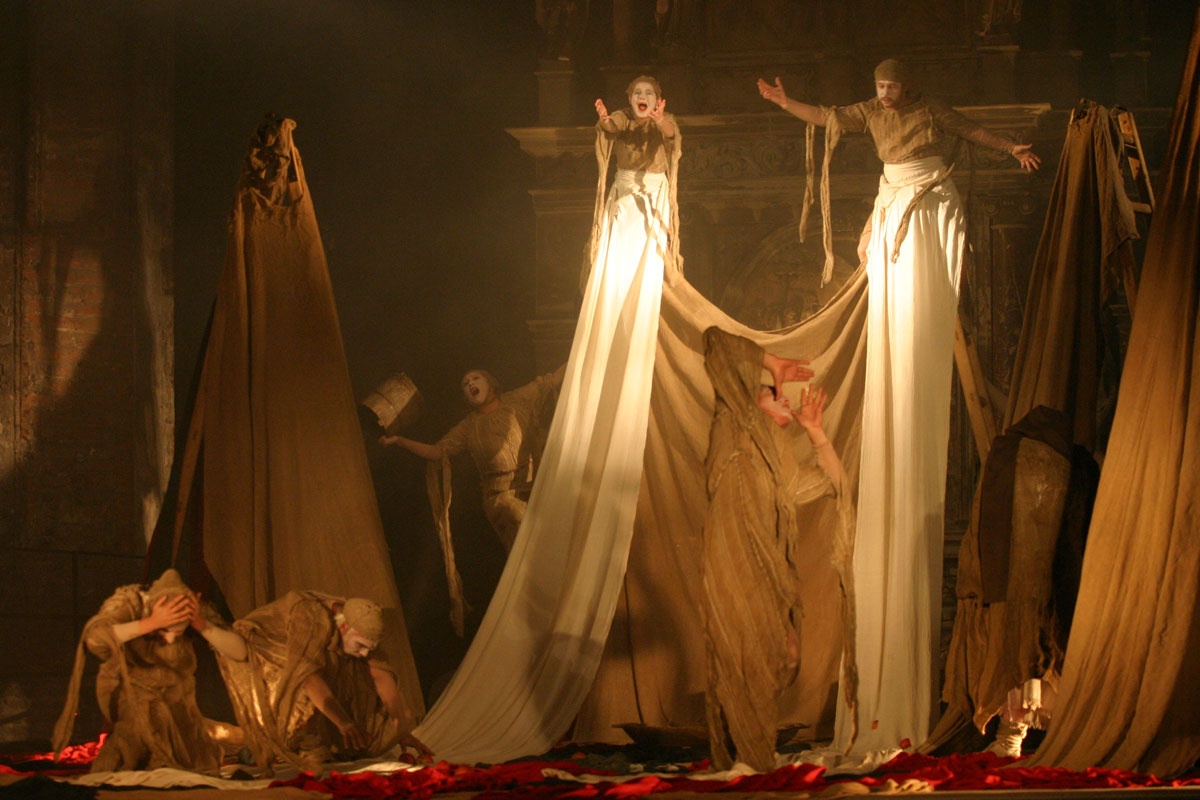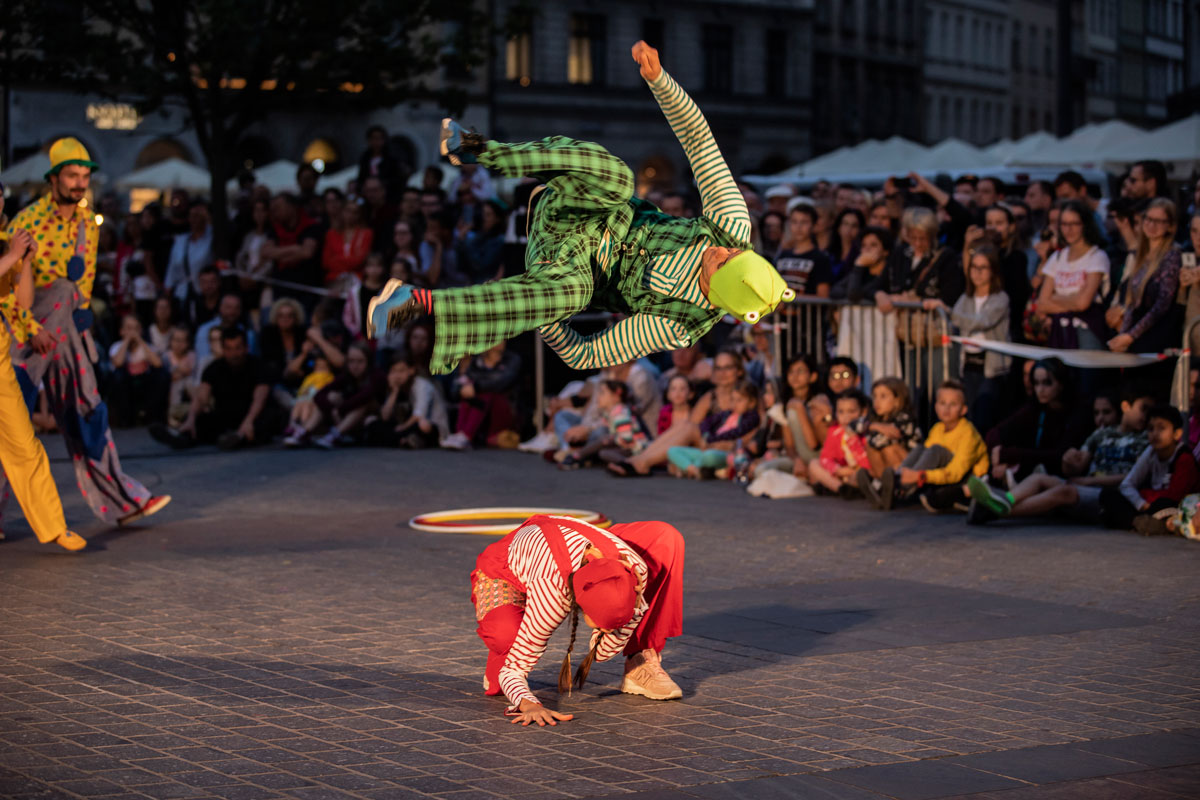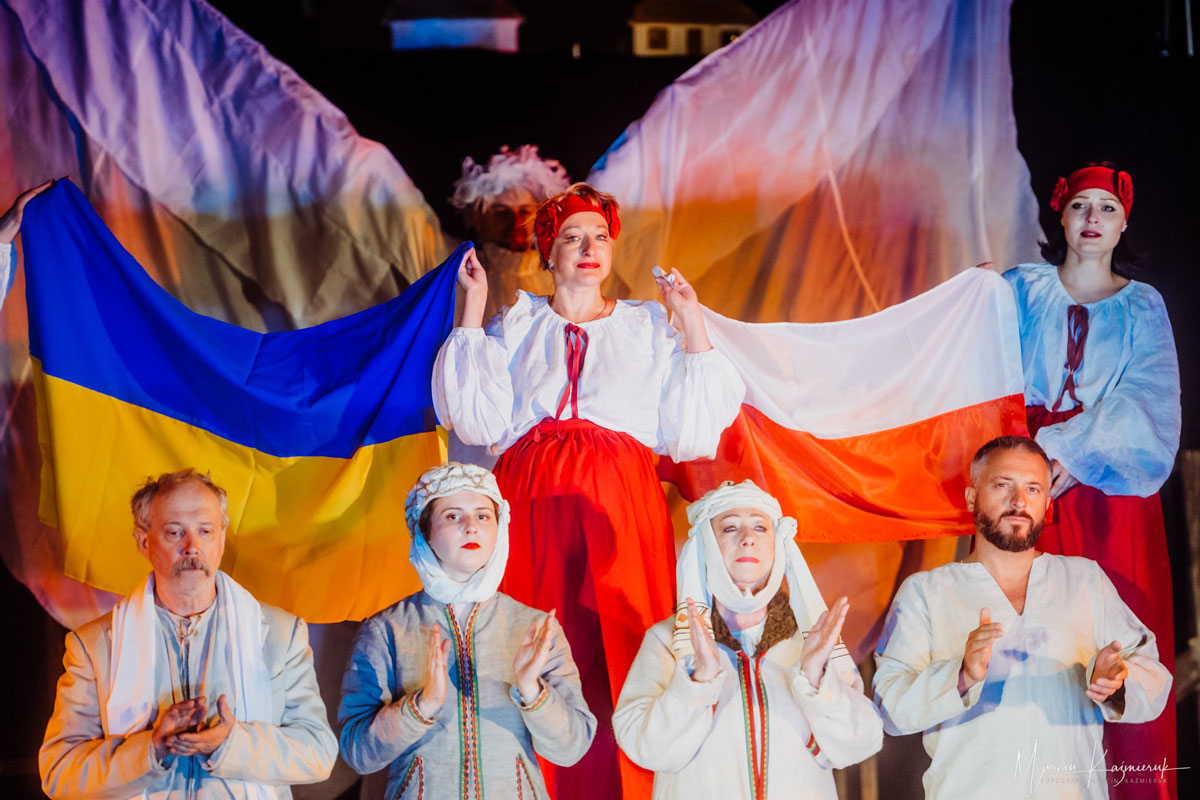

Author : Anastazjа Kanarska Published: culture.pl: March 22 2023
We talk about the specifics of street theatre, Ukrainian-Polish cooperation and the challenges of war with Krzysztof Dubiel, leader of the Polish-Ukrainian cultural project “Enjoy street theatre”, an experienced theatre manager
Krzysztof, you have been bringing Ukrainian theatre to Polish audiences for years. What particularly interested you and gave you the impetus for this activity?
There is a widespread opinion that our fundamental decisions are decided by coincidence. I can, with regard to my choice of professional activities, confirm it. Well, 30 years ago at the State University Kiev-Mogilinska Academy, Anatoliy Petrov, actor, director, academician, maker of the first street theatre in Ukraine, organized a conference at the Center for Culture and Arts (Культурно-мистецький центр НаУКМА) on the art of street theatre. At the time, I was deputy director of the Norwid Theater in Jelenia Gora, the Polish cradle of street theatre, and my boss Jerzy Zon, presently director of the KTO Theatre in Krakow, sent me to this conference in Kiev . Promoting street theatre as a full-fledged field of art among Kiev theatre academicians was not easy. In the early 1990s, it was quite common in Eastern Europe to have an academic model of theatre, and according to this model, a street theatre did not fit into Melpomene’s court. However, I was exceptionally fortunate, as Zdzislaw Hejduk, co-founder and director of Teatr 77 in Lodz, one of the most important and most frequently awarded alternative theaters of the 70s and 80s in Poland, was in a similar role as a promoter of alternative theatre. Together, we skillfully broke out of the role of doomed messengers, although I honestly admit that I doubt we would have convinced the Mogiliyan theatremakers at the time to be particularly attentive to street theatre. However, we managed to make acquaintances, later friendships and further cooperation for many years. There also appeared a natural curiosity about the performances of Ukrainian theatre, which we had already systematically invited to Polish festivals. The culmination of our cooperation at that time was a monumental show by the KTO Theatre entitled “Mazepa,” directed by Jerzy Zoń. Artists from the Kiev Experimental Theatre and the Lviv Voskresinnia Theatre were invited to participate in the show as the KTO cooperators.

What has changed since then?
Since the beginning of 1990, for two decades, our life in Poland has been hobbled by processes driven by the transformation of the political and social system and international politics. The theatre has felt this very clearly, and not only in economic terms. All previously valid canons collapsed, real and also those “proclaimed” authorities failed. Censorship was abolished, and with its departure the text containing allusions disappeared. Gone was the entire arsenal of signs, means of expression, ideas that formed the foundation and canvass of theatrical productions. A new generation came to the theatre, which, strengthened by the incoming theses of postmodernism – began the process of breaking with the previous theatre and artists of the past era.
Ukrainian theatre in many areas, perhaps somewhat later than in our country, entered similar fields of transformation, and additionally, in my opinion, faced more serious challenges directly related to the period of building the institutions of an independent state. After the Declaration of Independence was accepted, the construction of a national identity was a glaring concern. Unencumbered too much by structural dependence of supervision from the administrative machinery, Ukrainian theatres reached for works by native authors, who were not very well known in our country (M. Kropivnitsky, I. Kotliarevsky, O. Oles, M. Starytskiy), and this did not favor to the market aspects for success of guest performances for Polish audiences.
In Poland, we were able to show successfully performances by Stanislav Moysieev, staged at the Kiev Academic Young Theatre or later at the I. Franko National Theatre. I am pleased to remind you that Karol Wojtyla’s “Job”, presented in an experimental form by Yaroslav Fedoryshyn and the Voskresinnia Theatre, celebrated its triumphs on stage in Poland. Noteworthy was “The Maydan Diaries” by Natalia Vorozhbit, directed by Andriy May, which was prepared after the dramatic events in Kiev.

Street theatre is of particular interest to you. What are the advantages of this form of theater and what do Polish and Ukrainian representatives of this art form have in common?
If theater is defined as a type of social communication, then street theatre can be used to transmit simple messages. Street theatre can also be used to demonstrate diverse and extraordinary skills. In the most beneficial way, it can provoke discussion and dialogue between actors and audiences. Street theatre is probably as old as man himself. The early forms of it, known today are ancient Roman comedy, medieval passion plays, Commedia dell arte, Carnivale or Nukkad Natak (Indian street theater). Street theatre is an art of contact. It is well known that art, emotion, basic human values are not locked up in the edifices of museums, galleries, cultural centers, houses of theaters, but exist alongside it. Theatre for the casual spectator, the street passerby, using the simple language of gestures, universal signs, guarantees understanding and community. These two values bind together the latest trends in world theater. They were featured in the theories of Craig and Claudel; the theater studies of Barba, Brook, Grotowski
I have been observing street theater for 35 years. I had, previously through my work at the KTO Theatre until 2005, now from a managerial perspective, the opportunity to watch this phenomenon on different continents very closely. With changing needs and general access to technological solutions, huge, impressive outdoor shows have been created. The style of some performances has changed, the narrative has become shorter, literalism, insistence on the message and sometimes poor improvisation have appeared. And next door, and in overwhelming numbers, theatres that are able to metaphorically conjure up scenes that, if supported by music, an equal person of the drama, as it were, stimulate the imagination and encourage reverie and reflection, are pleasing to the senses. Such are also the Ukrainian artists. What constitutes the strength of the message is based on acting craftsmanship, great mastery of the artistry, physical prowess and, as in the case of the Voskresinnia Theatre actors, excellent mastery of the dramatic actor’s craft. Our performances are played without text, and presented at different times of the day and in the evening, they gain in spectacle and are able to evoke extremely strong emotions.

What is the current cooperation like, and do you think that this tragic time of war with Russia has, paradoxically, given Ukraine many opportunities to show its culture and theater to the world? Where can we expect to see Ukrainian actors on Polish theater stages in the near future?
Since 2003 I have been working with Lviv’s Voskresinnia Theatre, whose street performances we have managed to present in many countries around the world. We played, among others, in South Korea, on the border of Iran and Iraq, in Taiwan. I have noticed that the reception of the same performance, played in culturally and religiously different environments, confirms the similarity of human nature and sensitivity to the content presented. And if only for this reason, I repeat, for the obvious similarity of characteristics – I cannot fathom the reasons for mutual misunderstanding, of which war is an extreme example. It is impossible to predict, repeating after my favorite polemicist Kohelet: man cannot examine the work that is being done under the sun; however hard he tries to look – he will not examine. And even a wise man, however he may claim to know it – cannot examine it. (Koh 8:17) what repercussions in the order of civilization, let alone in the arts, will appear after the war. The unbelievably spectacular performances by Ukrainian street theaters that we presented last year in Poland were primarily an opportunity to express solidarity with Ukraine. There were no shortage of tears of emotion from the artists and thunderous, endless applause from the audience. For all these experiences we are very grateful. The war brings destruction and suffering to Ukraine every day. However, we too have learned to work under a tightened regime. Currently, the Ukrainian theaters cooperating with us, due to the ban on men between 18 -60 years of age going abroad, have prepared replacements where possible. However, most titles have gone into the freezer. In the coming summer season, we will play – which was very much on my mind – a performance by the Voskresinnia Theater , realized according to a script by Yaroslav Fedoryshyn Сни за кобзарем, (Polish title Ukraine. Testament Shevchenko). The show, which portrays the dramatic experience and situation of the Ukrainian people’s permanent plea for state independence, will be seen by Moldovan viewers of the BITEI Festival organized by the Eugene Ionesco National Theater in Chisinau, the MITEM V4 Festival in Venegy/Vyszegrad, Hungary, the International Festival of Street Theaters in Salcininkai, Lithuania and, among others, Polish renowned festivals. WALIZKA in Lomza, LA STRADA in Kalisz, FETA in Gdansk , CK AGORA in Wroclaw.
We areplanning to present a stage play “It’s all because of her” in Poland with Rimma Ziubina,the star of Ukrainian film and theatre.

The war changed everything. Our partner theaters, despite air raids, power outages, continue to stage their performances, and although it is too early to predict exactly when the situation will allow us to resume normal operations, we are starting to prepare for future tours.
Author: Anastasia Kanarska. Editor, translator of the Ukrainian section. Journalist, theatre photographer. Gaude Polonia Scholarship – 2020

